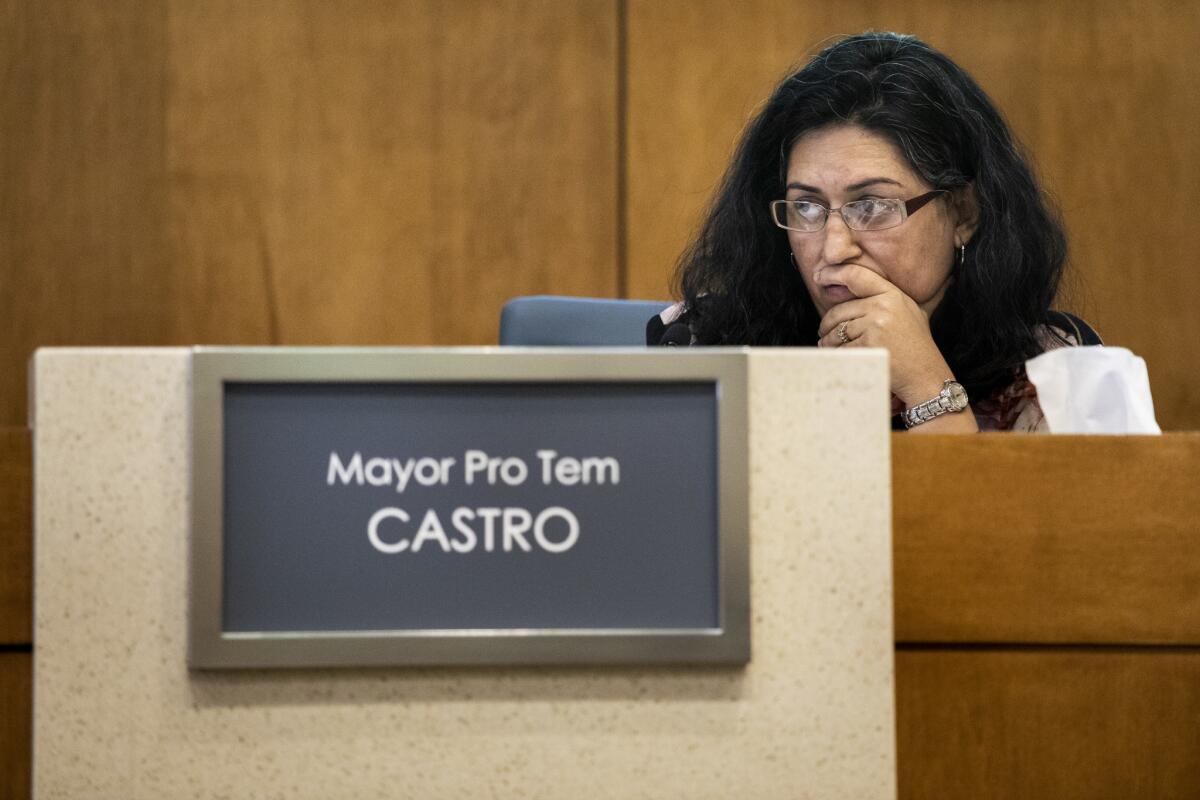Would this California town have become so pro-cannabis if not for a councilwoman’s pot industry ties?

Few local politicians have championed marijuana as loudly as Aide Castro.
She says the drug was crucial to treating a thyroid condition. And as a Lynwood city councilwoman, she was the driving force behind the city’s decision more than two years ago to become one of the first in Los Angeles County to embrace the newly legalized industry.
But while she was helping approve the city’s cannabis regulations, Castro was also quietly making money from the industry, a Times investigation found.
Castro didn’t report any of her dealings in the marijuana business on state-required financial forms until earlier this year, when she disclosed that she is a partner in two marijuana cultivation ventures. She reported that her ownership stakes are worth millions of dollars. Both the businesses are located outside the city, but one of her partners is embroiled in a legal dispute in part over ownership of a marijuana manufacturing license in Lynwood.
In February, Castro announced the formation of Candor Collections, a marijuana partnership that markets cannabis to women.
In recent years, she has also run her own consulting firm that does work for cannabis businesses, including Weedmaps, one of the nation’s most popular pot advertising platforms. She has never listed Weedmaps or any other clients on her state financial reports.
State law requires elected officials to report the identities of clients who pay their companies at least $10,000 in a year for consulting work if those clients were doing business — or were planning to do business — within the official’s jurisdiction.
In an interview, Castro told The Times none of her consulting clients met the $10,000 annual reporting threshold. But a Weedmaps spokesman later said the firm paid Castro $93,666 in 2017 — just as she and the council were changing local regulations to allow marijuana delivery by businesses in the city, as well as crafting and passing licensing agreements with local growers. Two delivery services in Lynwood now advertise on Weedmaps.
In a follow-up email, Castro said she first learned of the requirement to disclose consulting clients during her interview with The Times, and that she would amend her disclosure forms to include them.
Shortly before she disclosed her ownership in the two manufacturing businesses, Castro began recusing herself during votes on the marijuana regulation. Still, after one vote in January, Castro approached the city’s mayor and a councilwoman and criticized how they voted. Castro acknowledged the incident and said she has the right to express herself on marijuana issues in the city, even if she doesn’t vote.
“Just because I have to recuse myself from making decisions doesn’t mean I can’t point out bad policy,” Castro said.
In her interview with The Times, she said she stopped voting out of an abundance of caution and has done her best to follow the law. She declined to name her consulting clients, but said they don’t have marijuana businesses in Lynwood.
“I am trying my best to be transparent,” Castro said. “If I’m doing what’s required by law, to me I’m doing the right thing.”
Bob Stern, co-author of the state’s anti-corruption law known as the Political Reform Act, said he would need to know more details about Castro’s clients and how much they paid her to determine whether she is violating or complying with state law. But, he said continuing to advocating for pot interests on the City Council while working for Weedmaps would be “clearly unethical” and that Castro should choose either the marijuana business or serving as an elected official.
“If it’s not against the law, we should change the law,” he said.
Cultivating ties with elected officials in cities like Lynwood has become crucial to cannabis interests since California voters approved the sale and possession of recreational marijuana in November 2016.
About 80% of the state’s cities have refused to allow pot businesses to operate in their towns in part over worries that the industry has a shady reputation, spurs crime and, in some cases, has resulted in bribery charges.
After the newspaper asked other Lynwood council members about Castro’s financial ties to the industry, several expressed shock, saying her business dealings present “a red flag” about her reasons for promoting cannabis. They said her income from the marijuana industry now taints the last two years city leaders spent passing pro-pot legislation.
“It’s a big conflict of interest,” said Councilman Salvador Alatorre, an opponent of allowing marijuana businesses in the city.
“Had she not had alternative interests in the industry … the process would have been cleaner,” said Councilwoman Marisela Santana, who supports allowing local marijuana businesses.
Castro was first elected in 2007 to the City Council, a position with a $975 monthly salary. In the past she has worked in real estate, and in 2002 she opened a beauty salon.
In promoting marijuana, Castro draws on her personal experience with the drug. She said it helped her deal with the symptoms of having a growth on her thyroid gland and the surgery to remove it in 2016. She makes tea from marijuana — it keeps her migraines at bay and helps her sleep, she says — and uses a numbing cream derived from the plant.
“The cannabis industry is something I have a passion for,” she said.
Her history with the marijuana business dates further back. In 2001, she was charged with transporting 28 kilograms of marijuana, according to court records attached to her companies’ applications for commercial cannabis licenses in Los Angeles. She pleaded guilty to a misdemeanor and was sentenced to supervised probation for one year.
She declined to speak at length about her conviction but said she was a passenger in a car that had the marijuana. Prosecutors alleged in court records that she told a federal agent at the time of her arrest that she was offered $2,000 to smuggle the marijuana across the border from Mexico. A border inspection of the vehicle discovered the marijuana hidden inside the back seats, according to the records.
That conviction could help qualify her businesses for the city of Los Angeles’ social equity program, which grants priority marijuana commercial licensing to people with marijuana-related convictions.
She said her eligibility for the program is also why, in addition to her expertise in government, her business partners last year gave her shares of the companies. On her state disclosure forms, she reported that her separate stakes in Relative Phenomena LLC and Modern Determinism LLC are each worth more than $1 million. She told The Times she contributed no money in the companies.
In 2018, state law prohibited public officials from accepting gifts worth more than $470 from any single source. That limit has since been increased to $500.
One of Castro’s four business partners, Winston Park, signed a declaration as part of Relative Phenomena’s license application saying that he too has a marijuana-related conviction that qualifies him for the social equity program. Park said he was arrested by the California Highway Patrol in March 2014 and sentenced to 32 months in prison.
A Times review of court records shows that Park was also convicted in that case of evading police and has an extensive criminal record that includes felony convictions for distributing cocaine, possession of heroin while in prison, robbery and burglary.
While the two manufacturing businesses are located in Los Angeles, another partner in Relative Phenomena, Scott Kawasaki, has financial interests in Lynwood. He owns Los Angeles Kush, an L.A.-based dispensary and a brand of marijuana. He is embroiled in a lawsuit with a former business partner, and part of the court battle is over ownership rights to a pot manufacturing license in Lynwood.
Castro has not voted on issues involving that license since disclosing her partnership with Kawasaki on state forms earlier this year.
Castro said she regretted one council action — a proposal she made in November to negotiate a multimillion-dollar contract with Express Transportation Services, LLC. The proposal died on a split council vote.
Express Transportation Services employs Castro’s father-in-law as a shuttle driver and lists one of her marijuana consulting clients, Claudia Hernandez, as its director of administration and government affairs.
Castro said she didn’t know that Hernandez, who owns a Huntington Park marijuana dispensary, worked for Express. She provided consulting services for free because Hernandez is a friend, she said.
“I go above and beyond for all my friends,” Castro said. “That’s my reputation. It precedes me.”
A Weedmaps spokesman said the firm paid Castro as a contract employee from March to December 2017 to help with panels and workshops for local officials on marijuana policy reform. She also identified lawmakers “working to organize their own local cannabis policy” but never lobbied lawmakers on the firm’s behalf, Carl Fillichio said.
He said Weedmaps hired Castro when she approached the company “after she finalized her cannabis efforts” in Lynwood and “wanted to aid colleagues in nearby jurisdictions build effective policies.”
City records show that Castro continued voting on changes to the local marijuana regulations and licensing agreements with operators while working for Weedmaps.
Castro also formed a partnership with Aaron Herzberg, who runs a marijuana consulting business that helps sell or lease properties devoted to manufacturing cannabis and helps clients obtain licenses. The Puzzle Group’s website says it was involved in several property deals for marijuana businesses in Lynwood and helped secure a manufacturing license for one.
Around the same time as those deals, Castro voted to approve development agreements and licenses for at least three businesses operating at those properties, according to city records.
Castro said her consulting partnership with the Puzzle Group, announced in November 2017, ended shortly after it began. She insisted she was never paid.
Herzberg did not return phone calls for comment.
More to Read
Sign up for Essential California
The most important California stories and recommendations in your inbox every morning.
You may occasionally receive promotional content from the Los Angeles Times.










